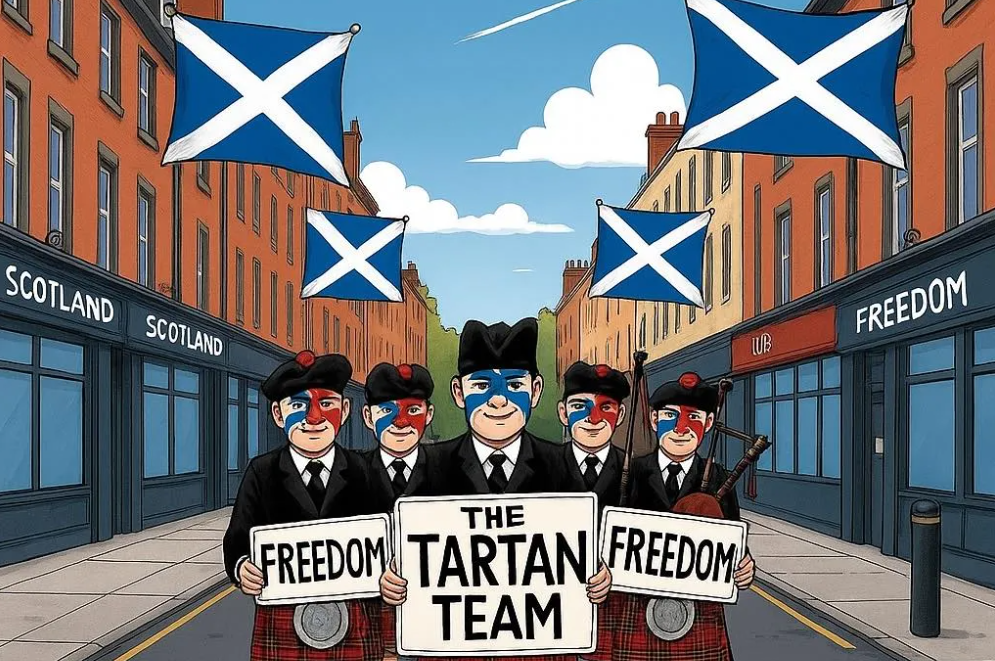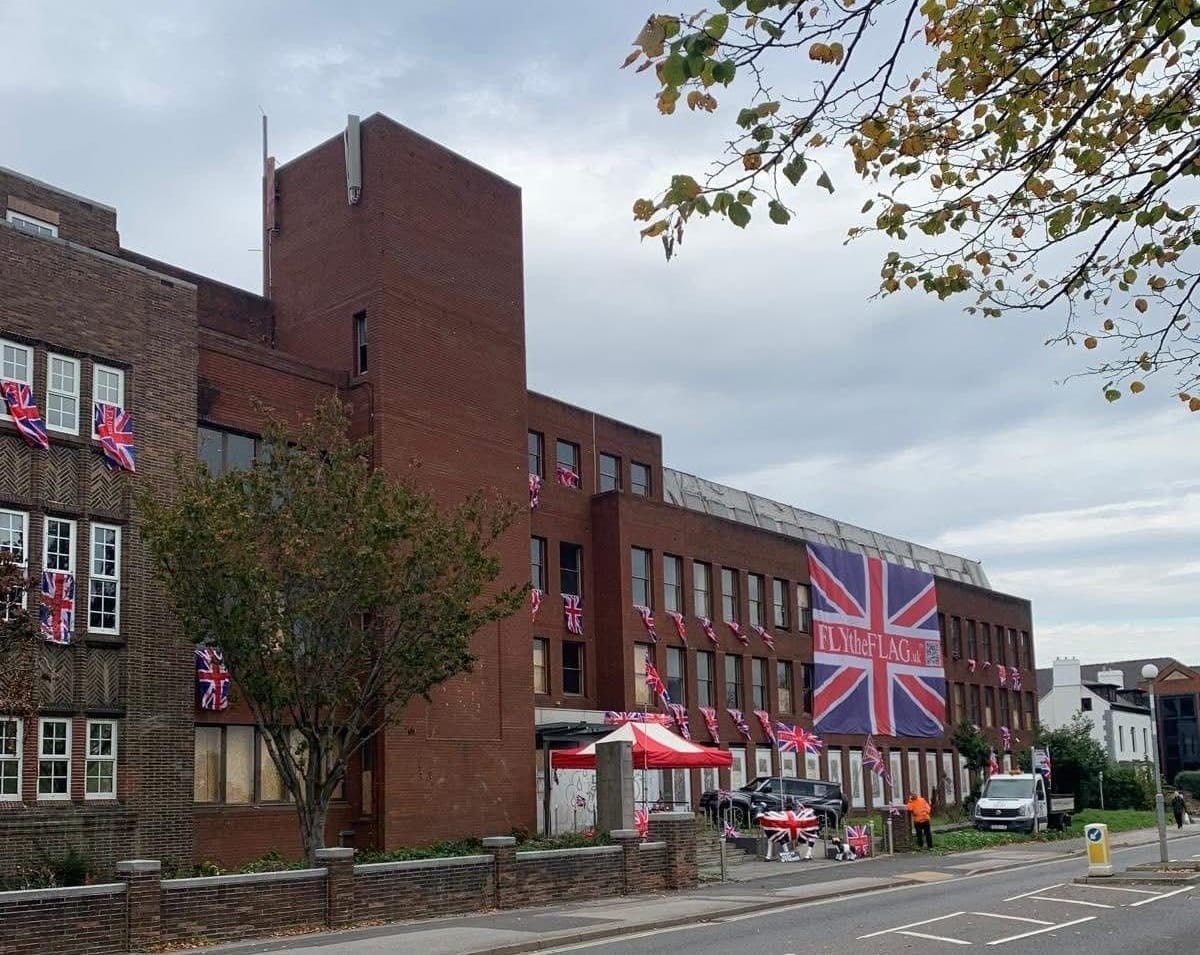The men who raised the flags

Nigel Farage says this summer’s movement was led by ‘ordinary people’ expressing their patriotism. That’s not what we found
Editor’s note: Today’s weekend read is a bit unusual: a collaborative effort with our colleagues at our sister Mill Media publications across the country. It pulls together the reporting we’ve all done on a big topic: the appearance of flags up and down the land. We thought it would be interesting to pool the in-depth local reporting we’ve done in five UK cities to try to give you a better picture of the people behind an influential movement.
There was a voicemail on my phone and it began like this: “Yo is this Jack the big, daft, fat fucking weird looking leftie cunt?”
Despite the fact he was calling from a withheld number, there could be little doubt: this was the voice of Lee Twamley. In late August, Twamley had been spearheading a campaign to hang union flags on lampposts and scaffolding around Salford and Manchester in protest against illegal immigration. Now, I had published a story about Twamley’s criminal past (ironically, he had been convicted of trying to smuggle four Vietnamese people into the UK) and he didn’t sound happy.
For the past few months, the sudden appearance of flags — Union Jacks hanging from motorway bridges; flags of St George flying proudly from bus stops; Saltires appearing above local shops — has prompted a national debate. Countless opinion columns have been written about the significance of the flags; daytime radio phone-ins have asked whether they should be welcomed as a sign of resurgent national pride or dismissed as symbols of ugly nativism. Some local authorities have been criticised for pulling them down, as have groups of people who have taken it upon themselves to “deflag” their neighbourhoods.
Today's piece marks the thrilling return of The Post's former editor, Jack Walton. Over the past few months, he's been working extremely hard to cover incidents of flag-raising across the UK; from uncovering a convicted people smuggler's work to raise dozens of flags in Manchester, to the erection of a 30ft flag outside Chesterfield council's offices. In today's piece, he draws all of that reporting together, intertwining flag-raising in Merseyside, Greater Manchester, Sheffield and beyond. It's an extremely important piece of reporting that has taken a long time to pull together. Stories like this are only possible thanks to our paid members, who part with a small amount of their hard-earned cash each month to support our journalism. While this piece is free to read, we urge you to sign up for a paid subscription today to ensure we can keep fighting the good fight and give Merseyside the kind of high quality, local journalism it deserves. It costs just £1 a week thanks to our introductory offer. Click the button below to give it a go.
But who are the people who put these flags up in the first place? That detail seemed to be missing from most of the coverage, which has been dominated by opinion and analysis in the national media rather than reporting on the ground about the people who have powered this movement.
My colleagues and I have been focusing on that question. Who are the flag raisers? What’s motivating them? Nigel Farage said that they are “ordinary people” putting “two fingers up” at the establishment. But is that right — or do many of them have politics that are far from ordinary?
This piece is an account of what happened when reporters from five Mill Media publications decided to find out more about the flaggers: the people whose small-scale political activism has created a mini-culture war about how we display our national identity.
Weoley’s warrior class
To trace the flag-raising movement to its origins you have to head to Birmingham, and more specifically to the mostly working-class neighbourhood of Weoley, comprised largely of interwar council stock houses.
Towards the end of the summer, my colleagues Kate Knowles and Samuel McIlhagga — who run The Dispatch in Birmingham — began trying to work out who was behind the movement. They found that months before Twamley had scaled his first lamppost, a group of men calling themselves the Weoley Warriors began doing exactly the same. “We are the founding figures and master architects of the historic and glorious flag movement that is sweeping across this great land of ours,” they wrote on their online fundraising page.
The Weoley Warriors, on the face of things, were the kind of ordinary patriots Farage describes: led by a 45-year-old electrician called Sean Doolan. Taking credit for the newly-hoisted flags at the beginning of August, Doolan explained that his mission was simply to bring “pride to the area…nothing more, nothing less”.
This is where it gets a bit confusing, though. While the Warriors appear to be ground zero in Birmingham, two other men soon surfaced claiming to be the original flaggers: businessmen Ryan Bridge and Elliot Stanley. The duo appeared on GB News in late September to tell the story of one of their flagging outings in the Stirchley neighbourhood. It began with a “carnival atmosphere” but soon soured when a group of “white middle-class liberals in pop-up bars” started calling them far-right.
“This is nothing to do with far-right movements,” Bridge said. On the GB News couch, they repeatedly plugged their website raisethecolours.org, where they were taking donations to purchase more flags, and where they also describe themselves as the founders of the flagging movement.

Kate and Samuel started taking a closer look at Bridge and Stanley. The latter, it turned out, is the previous director of Sex Doll Official, a company selling customised sex dolls that Stanley ran with his wife and 17-year-old son (a short documentary about the company opens with the fantastic line: “it’s not every day you have a sex doll in your lounge with your 17-year-old”). The former, meanwhile, has also made headlines in the past: a story in the Mirror reports that Bridge was investigated by Spanish police for his role in a scam where a group of Brits allegedly made bogus compensation claims for food poisoning to hotels in Majorca.
When we contacted Bridge, he told us the trial had already happened — a claim contradicted by a Spanish journalist who told us the trial was still to go ahead. Confronted with this, Bridge changed tack, instead saying that The Dispatch was obviously a “left wing” publication set on ruining his name. We also asked him why his company had yet to be registered, as people making donations would want proof it was a legitimate organisation. Bridge told us this was “in process” and that it was “100% legitimate”.
As of today, no company has been registered.
Enjoying this free edition of The Post? You can receive more just like it straight into your email. Sign up for free today and get briefings and features delivered to you. The best bit? You'll be supporting us in the creation of more independent local journalism like this.
‘Gas them all’
Writing in the S*n on 16 September, Nigel Farage described his pride at the sight of Union Flags hanging from “lampposts” and “hedgerows” around the country. And he was certain about one thing: this was a revolt of ordinary, decent, people. “This is a grassroots movement driven by ordinary people, not politicians,” he wrote. “It’s a collective two fingers up to the establishment.”
Councils who opposed the flag-raising, such as Birmingham’s Labour-run authority, where the initial policy was to take them down if they were fixed to publicly-owned lampposts, were immediately branded unpatriotic. Conservative shadow justice minister Robert Jenrick lambasted “Britain-hating” councils. As the movement grew, Sir Keir Starmer felt compelled to say that he is “a supporter of flags” and “very encouraging of flags”.
Plenty of people have been moved by the display of flags, and have reciprocated by hanging outside their homes and in their gardens. It’s obviously not the case that everyone involved in the Raise the Flags movement has a criminal history or holds extreme views. In Salford, we met a woman called Pauline who said she was concerned about “racists jumping on the bandwagon” but she broadly felt it was “fair enough” if people wanted to hang up patriotic flags. This seemed pretty sensible, and presumably close to the dominant public sentiment.
And yet, it is striking how many of the key players we have looked into — the people who have gone out of their way to put up hundreds of flags — seem anything but ordinary. In my experience, most people do not share overtly racist social media posts; they do not have criminal records for people smuggling or involvement in racist crimes. But time and again, our reporters — and others looking into this — have found key flag raisers with these kinds of CVs.
Take Bootle in Liverpool, where several dozen flags appeared at the end of September. I contacted Paul Walters, the leader of a loyalist flute band who claimed responsibility for nearly 100 of the flags, and he told me his motivation was simple: “because I’m British no other reason”.
But a quick scroll of his social media accounts tells a familiar story: videos of people blackening their faces with charcoal, to which Walters comments: “only way you're getting a new house these days”. He also shares conspiracy theories that the man who drove his car into a crowd of Liverpool fans at a parade in May was actually not white and British (the man charged with the offence is indeed white British).

What about in Scotland? At the end of August, a group of self-described “young dads” began heading out into north Glasgow and hanging Saltires on lampposts. They called themselves the Tartan Team and said the movement had nothing to do with immigration: rather they were protesting “politicians and councillors” who were presiding over a crumbling public realm and ever-worsening living conditions. Nevertheless, Saltire-raisers earned the approval of Tommy Robinson, who shared images of their work online.
On the face of things, it did seem this movement was of a different flavour to its English counterpart. That is, until the team at The Bell, Robbie Armstrong and Calum Grewar, started looking into Kieran Logan, the man who started the fundraiser to buy new flags. And on the evidence of his social media posts, Logan’s politics were pretty extreme.
He had replied to a video allegedly showing a fight between asylum seekers in Spain by saying “gas them all”. He also shared a video claiming “the answer for America lies… in Germany with a man named Adolf”.
Confronted with these posts, Logan initially went into denial mode: we had the wrong Kieran, he said. When a journalist from the Daily Record finally got Logan on the phone, he instead decided to try to put his Hitler approval in context. “Everybody is entitled to their own opinion. I understand that Hitler went nuts at the end,” Logan explained. “No wonder, the drugs do that to most people. But at the start he had good intentions. Maybe they slipped a bit but he had good intentions for his country.”
Much like the supporters of Twamley in Salford, when we published Logan’s social media posts, the backlash was immediate, including a series of remarks from his supporters on a popular local Facebook page insinuating that The Bell team who broke the story are paedophiles.
The Land Rover interview
James Holmes, a property developer from Dore, an affluent suburb of Sheffield, is a bit different to the other flaggers we have reported on: his flagging style is less about volume and more about scale.
Holmes recently draped a 100-foot-wide, £3000 Union Jack across a large, empty former council building that he owns in the area. Holmes’s enormous flag is a response to Chesterfield Council’s opposition to his previous flag, humbler in size at 30 feet long (which was unfortunately ripped to shreds by Storm Amy).

The issue, according to the council, wasn’t that he’d hung the first flag, but rather that it had the words FLYtheFLAG.uk written across it, thus making it a breach of planning controls as Holmes had not applied for advertising consent. Much like Stanley and Bridge’s raisethecolours.org, Fly the Flag is Holmes’s attempt to brand his flag-raising. There is also ‘Operation Raise the Colours’, started by former English Defence League bodyguard Andrew Currien. The far-right monitoring group HOPE not Hate pointed out that Currien had been convicted of affray after the death of Stainton Barrett, a Wolverhampton man who was subjected to racist abuse and crushed to death by a car in 2008.
This week, Holmes made his GB News debut, explaining that he’d been branded a “racist” by outraged locals. It’s a refrain that’s been used repeatedly by the people raising flags, that their patriotism has been reframed as something more sinister by self-loathing liberals. Holmes found the suggestion that he was in any way racist outrageous. The Tribune team in Sheffield sent Mollie Simpson along to meet him. Conducting an interview in the back of his Land Rover Defender (with a flagpole on the back of the vehicle), he made similar protestations about people who had accused him of racism and graffitied “Nazi” on the side of his building.
When we raised the fact that Holmes recently shared a Facebook post calling for “all mosques in the UK to be shut down” he responded initially with denial. “I don’t think I posted that. Did I?” he replied. Holmes quickly changed course, admitting that he may have. “I maybe did. I did. I maybe did a repost.”
Sadly, I never did manage to sit down with Lee Twamley — the man who inspired our nationwide quest to track down the flaggers. Despite him angrily demanding to meet me after the publication of our first story, and my multiple attempts to do so thereafter, he always mysteriously stopped replying at the final moment. Even this week, after arranging to meet for a pint in his favourite pub, the Winston in Salford, Twamley backed out.
Our story about him was picked up by the national press, including the Daily Mail, who printed his hilarious excuse for his criminality: that he was actually smuggling the Vietnamese migrants into the country to work as labourers on cannabis farms, so they wouldn’t be leeching off the state like the immigrants he was protesting. Twamley was even covered overseas, where the Dutch newspaper NRC kindly tried to translate his voicemails to me for their readers: “Yo is dit Jack the big, daft, fat fucking weird looking leftie cunt?”
It’s not hard to see why Twamley became such a popular symbol of the movement. His hypocrisy was so brazen that it was impossible not to laugh. But the truth demonstrated by our reporting across five separate cities is that he was part of a wider pattern.
Wherever we looked for the prominent flaggers and leaders of this movement, we found people smugglers and sex doll salesmen, people with dubious criminal pasts and people willing to put in a good word for Adolf Hitler. Farage told us the flag-raisers were just ordinary folk sticking it to the system. A few months worth of local journalism later, that now looks like a shaky claim.
Thanks for reading today's piece, written by Jack Walton. A quick reminder: doing this kind of journalism takes dozens of hours of research, interviewing and writing. If you appreciate what we do, please consider becoming a paid member today. It costs just £1 a week thanks to our introductory offer. Click the button below to give it a go.
If someone forwarded you this newsletter, click here to sign up to get quality local journalism in your inbox.
If you’d like to sponsor editions of The Post and reach over 35,000 readers, you can get in touch or visit our advertising page below for more information

Comments
Latest
Last minute drama, local revamps and Liverpool Doc Club
Is Williamson Square Liverpool's own Times Square?
A chaotic afternoon with Reform’s newest Wirral recruits
As Chinese car-making booms, Liverpool spots a chance to reindustrialise
The men who raised the flags
Nigel Farage says this summer’s movement was led by ‘ordinary people’ expressing their patriotism. That’s not what we found